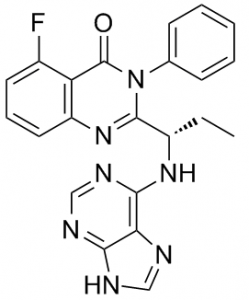Under scrutiny: The EMA reviews cancer medicine Idelalisib (Zydelig) after the occurrence of serious adverse effects, some of them fatal, in three clinical trials

Last Updated on March 20, 2016 by Joseph Gut – thasso
The review has been started because an increased rate of serious adverse events including deaths, mostly due to infections, was seen in three clinical trials investigating the medicine in combination with other cancer medicines. The clinical trials involved patients with chronic lymphocytic leukaemia and

indolent Non-Hodgkin lymphoma. However, the study in chronic lymphocytic leukaemia investigated combinations of medicines that are currently not approved and the studies in Non-Hodgkin lymphoma included patients with disease characteristics different from those covered by the currently approved indications.
Investigators of all clinical trials involving Idelalisib (Zydelig) are currently being informed of the actions to be taken in relation to the conduct of three ongoing studies, namely the studies GS-US-312-0123, GS-US-313-0124, and GS-US-313-0125. EMA will now review the data from these studies to assess whether the findings have any consequences for the authorised uses of Idelalisib (Zydelig). In the meantime, patients starting or on treatment with Idelalisib (Zydelig) should be carefully monitored for signs of infections. If Idelalisib (Zydelig) is well tolerated, treatment should not be stopped. EMA is considering whether any other immediate measures are necessary while the review is ongoing. The Agency will communicate further and keep doctors and patients informed as appropriate.
More about Idelalisib (Zydelig)
In the European Union, Idelalisib (Zydelig) is authorised for the treatment of:
- chronic lymphocytic leukaemia in patients who have received previous treatment as well as in previously untreated patients who have certain genetic mutations in their cancer cells. It is used in combination with rituximab.
- a type of non-Hodgkin lymphoma called follicular lymphoma where it is used on its own.
The pharmacological active ingredient Idelalisib acts as a phosphoinositide 3-kinase inhibitor; more specifically, it blocks P110δ, the delta isoform of the enzyme phosphoinositide 3-kinase. It appears to be avery effective drug that leads to rapid resolution of lymphadenopathy and splenomegaly, while lymphocyte counts take longer to decrease to normal levels with Idelalisib. Idelalisib is effective in patients who have a p53 mutation, which otherwise tends to impart a poor prognosis in CLL patients. However, even in the currently approved indications, the clinical adverse effects include diarrhea, fever (pyrexia), fatigue, nausea, cough, pneumonia, abdominal pain, chills and rash, and laboratory abnormalities may include neutropenia, hypertriglyceridemia, hyperglycemia and elevated levels of liver enzymes. More clinical information on the approved uses of Zydelig can be found in the product information. Patients who have any questions about their treatment should contact their doctor.
More about the procedure and the next steps
The review of Zydelig has been initiated at the request of the European Commission, under Article 20 of Regulation (EC) No 726/2004. The review is being carried out by the Pharmacovigilance Risk Assessment Committee(PRAC), the Committee responsible for the evaluation of safety issues for human medicines, which will make a set of recommendations. The PRAC recommendations will then be forwarded to the Committee for Medicinal Products for Human Use (CHMP), responsible for questions concerning medicines for human use, which will adopt a final opinion. The final stage of the review procedure is the adoption by the European Commission of a legally binding decision applicable in all EU Member States.


22/07/2016: The CHMP (EMA’s Committee for Medicinal Products for Human Use) now confirms recommendations for use of Idelalisib (Zydelig)
Patients should be monitored for infection and given antibiotics during and after treatment
The CHMP has confirmed that the benefits of Zydelig (idelalisib) in the treatment of the blood cancers chronic lymphocytic leukaemia (CLL) and follicular lymphoma outweigh the risk of side effects. However, following a review it has updated recommendations to minimise the risk of serious infections in patients treated with the medicine.
All patients treated with Zydelig should be given preventive medication against the lung infection Pneumocystis jirovecii pneumonia during treatment and this should be continued for up to 6 months after treatment with Zydelig has stopped. Patients receiving Zydelig should also be monitored for signs of infection and have regular blood tests to measure the level of white blood cells. Low white cell counts can indicate an increased risk of infection and treatment may need to be interrupted. Zydelig should also not be started in patients with any generalised infection.
In addition, following an interim precautionary recommendation not to start Zydelig treatment in previously untreated patients with CLL that has certain genetic mutations1, the CHMP now concludes that treatment with Zydelig can again be started in these patients provided they alternative treatments are not suitable and provided that the measures to prevent infection are followed.
Please see the whole communication here:
http://www.ema.europa.eu/ema/index.jsp?curl=pages/news_and_events/news/2016/07/news_detail_002573.jsp&mid=WC0b01ac058004d5c1